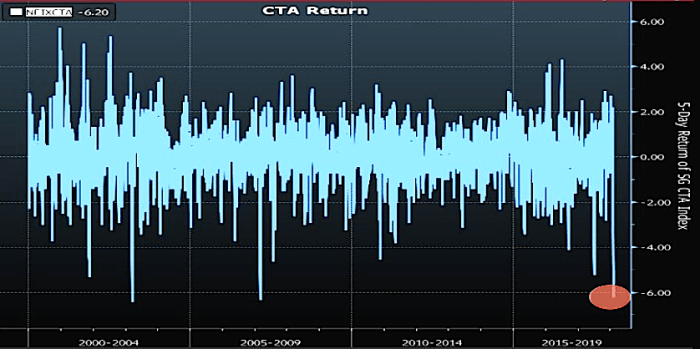Right, so last night we brought you the following chart which seems to suggest that at least according to the SG CTA Index, CTAs just had one of their worst 5-day runs in history:

Notably, that was through Wednesday – i.e. not including Thursday’s action. “With pain like this, one would hope a significant deleveraging may have already occurred,” Bloomberg’s Ye Xie wrote of the wipeout.
There are lingering questions (and really, these questions have been hanging over quants since at least August 24, 2015, when everything went to hell in a handbasket amid jitters about the fallout from China’s devaluation of the yuan two weeks prior), about the impact of CTAs, vol. targeting strats, risk parity and [fill in the blank with any strategy Marko Kolanovic has mentioned in the past two years].
The worry is that they will mechanically deleverage depending on the severity and scope of a given adverse market event and the impact of that selling pressure is the subject of vociferous debate.
One question following last week’s turmoil and the even more dramatic moves this week, is whether systematic selling played a role and, more to the point, if it has a role to play going forward in the event volatility remains elevated. It seems virtually indisputable that exposure was running high going into February.“As trend followers, CTAs (c.US$350 bn, Source: BarclayHedge) would in simple terms buy assets with positive momentum – and the recent negative short-term trend reversal in equities triggers selling,” Goldman wrote earlier this week, before adding that “risk parity and vol target funds, which have combined AuM close to US$1 tn, have also likely increased their exposure to equities due to their low volatility – they use both realised and implied measures of volatility (and often also correlation.”
Now obviously none of this is “new” per se, and clearly you can’t just lump all of these together as people are prone to do (risk parity, for instance, won’t de-risk as quickly as the others), but as Goldman goes on to write, it is entirely possible that should realized vol. reset higher over the next couple of weeks and if bonds continue to sell off with equities, deleveraging from those funds could continue.












Leave A Comment